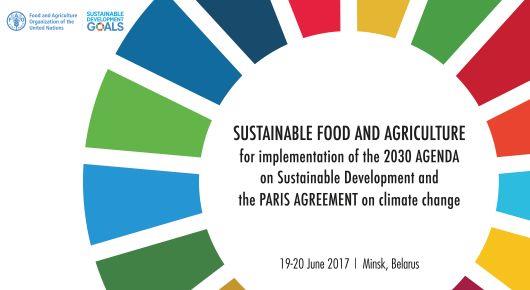Conference in Belarus eyes a future where food, agriculture are sustainable

Food production is one of the major causes and simultaneously the greatest victim of climate change. While weather extremes and other changes pose a risk to agriculture, current farming practices definitely contribute to the problem.
The good news is that measures to enhance agriculture’s adaptability can benefit sustainability and productivity and help reduce climate change.
A two-day regional workshop opening here today will link country needs and examples with the technical expertise and global insight of the Food and Agriculture Organization of the United Nations (FAO).
Two international agreements – the 2030 Agenda and the Paris agreement on climate – consider all three dimensions of sustainability: economic, social and environmental. Both accords call for a comprehensive and participatory approach, owned and led by countries themselves.
“The interconnectedness of Sustainable Development Goals implies that actors supporting countries in implementing and monitoring the goals have to partner and share their knowledge,” said Raimund Jehle, FAO Regional Programme Leader for Europe and Central Asia, in his opening statement.
Jehle also highlighted three regional initiatives of FAO, tailored to the needs of the Europe and Central Asia region. Two of the initiatives help empower smallholders and improve agrifood trade and market integration, while a third, currently in the planning phase, will address climate change and responsible management of natural resources.
On behalf of the hosting institution, the National Academy of Sciences of Belarus, Chairman of its Presidium Vladimir Gusakov welcomed workshop participants.
Coming from 19 countries across Europe and Central Asia, the nearly 100 participants represent the worlds of public administration, producer and farmer organizations, FAO development partners, and financing institutions.
FAO strategic programme leaders Clayton Campanhola (on sustainable agriculture) and Jamie Morrison (on food systems) presented the Organization’s approach and recommendations.
Principles of sustainable food and agriculture entail protection of both the planet’s natural resources and rural livelihoods. Greater efficiency in the use of natural resources, resilience of rural communities, and responsible and effective governance mechanisms are considered essential.
With its “Save and Grow” approach, “Climate-Smart Agriculture” and other programmes and recommendations, FAO promotes ecosystem-based agricultural systems, reduction of food losses and waste along the food supply chain, climate-resilient crop varieties and adapted livestock breeds. This new paradigm takes into consideration environmental costs, climate change mitigation and adaptation measures in every part of the food system.
During the Minsk workshop, many countries will begin to map their national sustainability targets, identify information gaps, and think about how to fill them.
The workshop programme also includes opportunities for forming partnerships and financial cooperation among countries, civil society, academia, and international financing institutions.
Similar FAO events are taking place in other world regions as well. A workshop in Budapest in December 2016 also attracted broad participation.
19 June 2017, Minsk, Belarus
